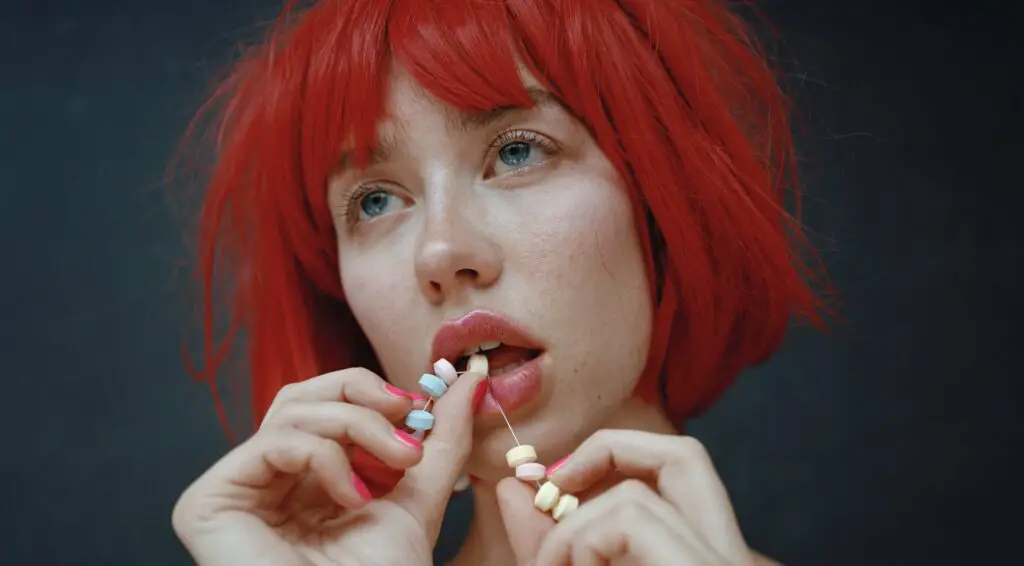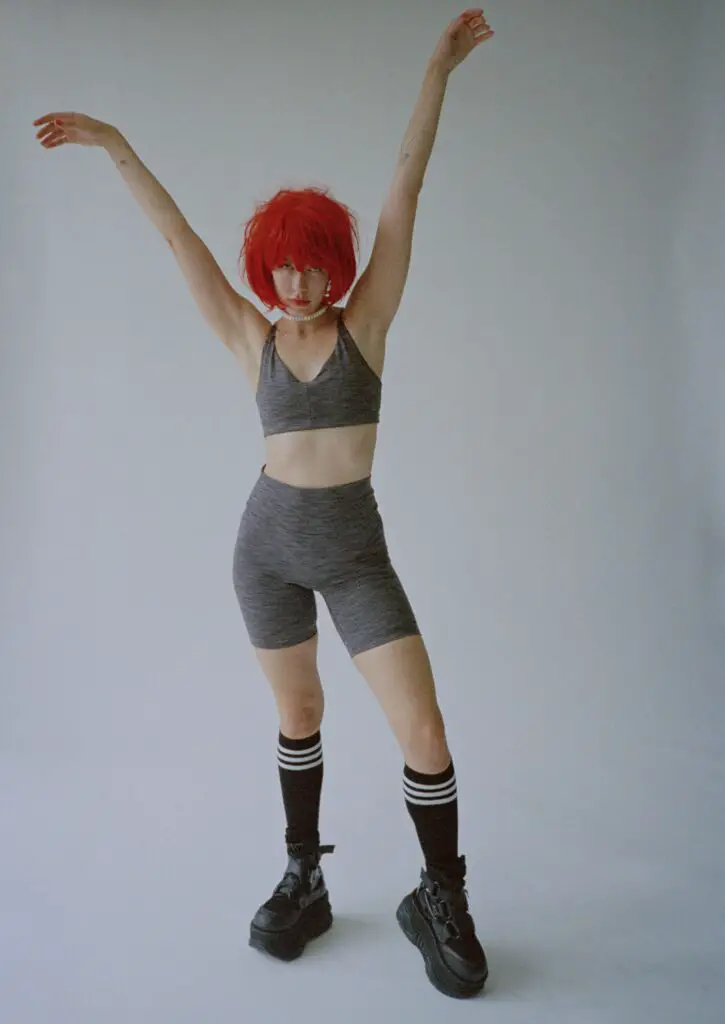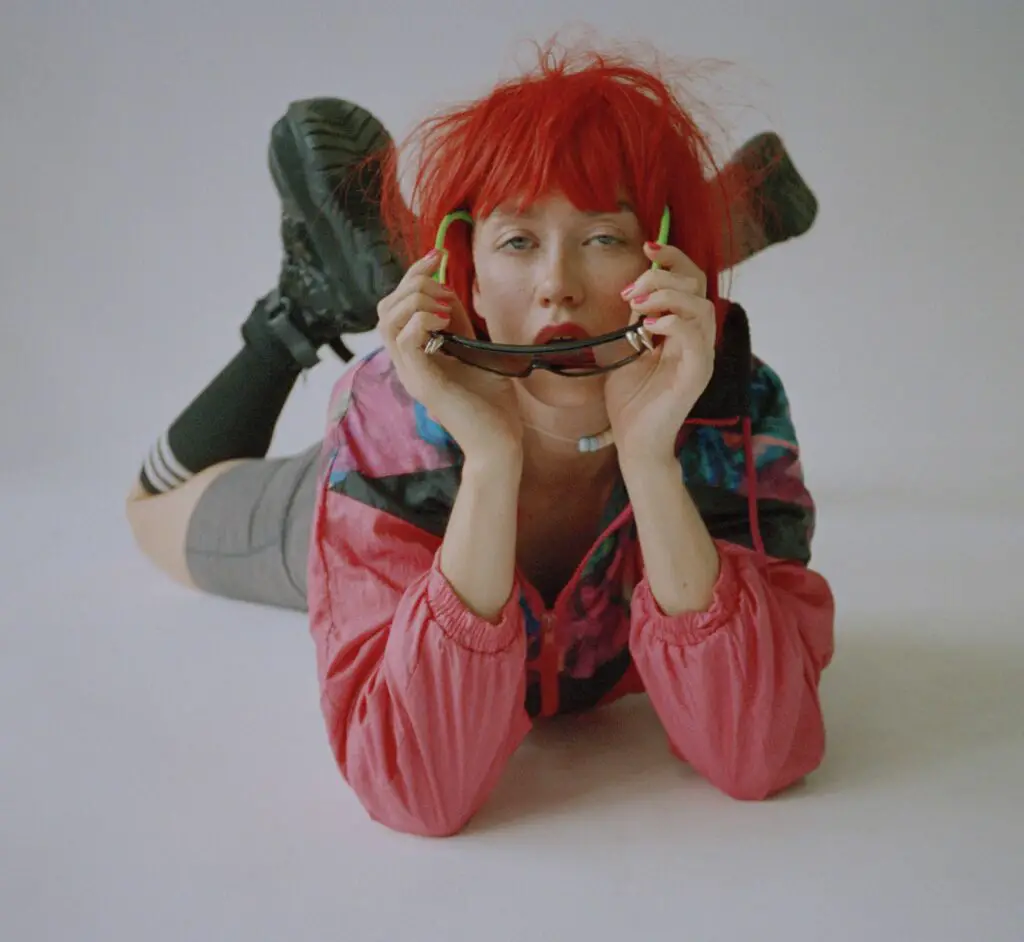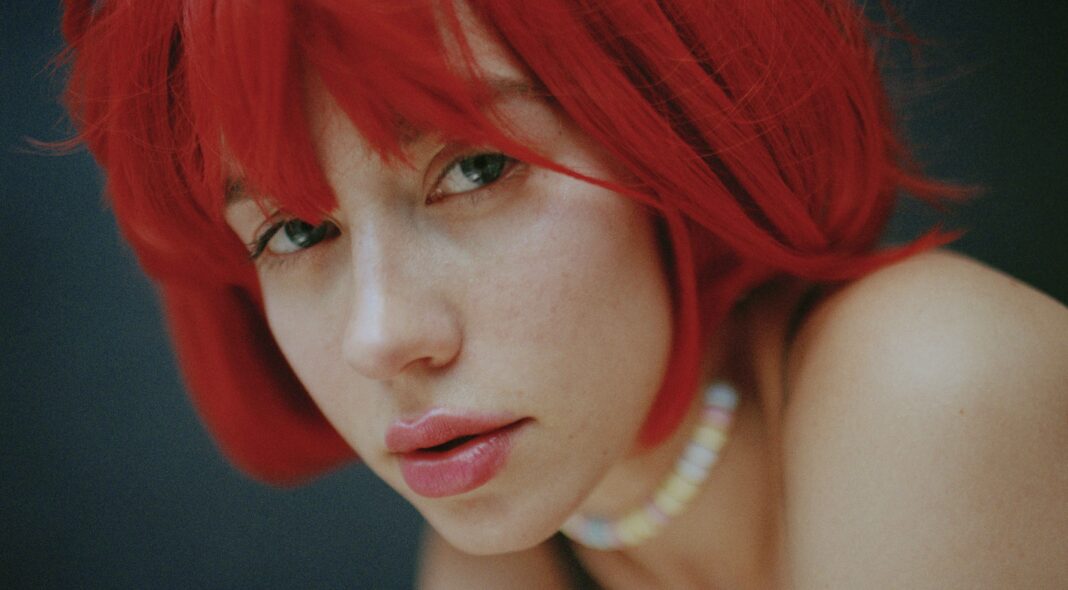Listening to the treasure trove that is Madge’s music, you might think they’re something of a pop magpie, collecting inspiration from a vast canyon of disparate records like shiny scraps and melding them together to make their own unique sound. Madge’s songs are best described as unpredictable: will that wobbling bass-y synth be followed by a headbang-worthy riff? Or perhaps a collage of electronics and glitchy production that sounds so futuristic it feels like you’ve been catapulted forward a full millennium? If you can guess the right answer, it’s probably an incredibly lucky fluke.
“I don’t listen to a lot of music in general,” Madge grins over Zoom from their home in LA. It would be interesting to hear any musician say that, let alone one who’s creations sound so full of life. Madge nods in agreement. “I think it’s hard for my brain to listen to music and not pick it apart – it becomes a really active experience. I can’t relax while I do it. I guess I listen mostly to podcasts and audiobooks.”
Instead, the Utah-born, LA-based musician pulls all that invention and boundary-pushing mostly from their own head – literally. Madge’s songwriting, especially on new EP ‘Ethanol (Multiverse Vol. 2)’, is designed as a a way to “channel the different voices in my head”. “That sounds strange or emo, but actually is, I think, very silly,” she says. We caught up with Madge to get the lowdown on their latest release, how being raised Mormon affects their songwriting and working with the almighty Pussy Riot.
Hi Madge! What are you up to today?
“I have a really cute grandma neighbour and she loves to make me coffee and pastries. So she made me a coffee and put it by the door, then sat around and waited for me to finish and was like, ‘I have these cookies too, you need some right now’. I got some music work done too but it’s been pretty uneventful, as most days are.”
Cute! You released your new EP ‘Ethanol (Multiverse Vol. 2)’ recently. You said that releasing your debut single ‘Fight Or Flight Club’ felt exhilarating – is that something that wears off once you’re more seasoned?
“I think with every single release I feel very insecure. As soon as it comes out I’m like, ‘Oh this song is so stupid’. I hate everything immediately. But yeah, I would say every release has an intense rush to it.”
Why do you feel insecure about releasing things?
“It’s just such a vulnerable, weird thing to put into the world. Even though I might like making it, I don’t know if people are gonna like it. I’ve had to learn to not take it personally because it feels so personal. It feels like they don’t like me. It’s like, ‘Oh that’s my brain you don’t like’.”
You write and produce everything yourself and your music is very personal. How much is songwriting a way to unpack your own experiences?
“That’s the main way I do that. There’s something really cathartic about taking a really intense experience that maybe took years to fully experience and put it into two-and-a-half-minutes of sound. It’s not that it takes it away, but it definitely frames it differently. I like the objectivity that I get when I turn a feeling into a sound.”

On ‘Ethanol’, the title track of your new EP, you switch from these whispering half-chants to a barrage of noise at the end. What are you trying to reflect in those sounds?
“‘Ethanol’ is talking about proclivity for addiction and inherited trauma. If I can take those things that feel quite scary in my head and translate them into a lot of funny voices and interesting soundscapes, it renders them powerless over me. I feel like doing that feels like an interesting way to share with people how it feels when I’m experiencing something overwhelming or scary.”
You were raised Mormon and, although you don’t belong to the religion anymore, you’ve said a part of your brain will always be Mormon. How does that affect both your worldview and your songwriting?
“I heard that when you start to learn right from wrong and religious morals or values, it actually happens the same time you develop language. So having been raised Mormon from birth, I think the way that I speak and interpret things in my head is the language of Mormonism. It’s not even a filter, it’s just how I see and feel things. I can step away from that sometimes and be like, ‘Oh, I see it now. That’s my Mormon brain framing this a certain way.’ It still feels like such a part of me.”
‘Hey Hi’ is about the deep sexual shame you’ve been conditioned to feel by Mormonism – something you say you’ve “never put up on a shelf”.
“I feel like in sexuality, especially in the US, it’s just rife with shaming. But most folks are able to somehow compartmentalise that a little bit more. So maybe they watch porn but because they can separate themselves from this societal shame, they still have this habit, whereas I feel totally paralysed. I feel like it’s just always right there, constantly.”
You’ve also joined the long list of musicians who’ve written a diss song, but yours is about yourself. Explain!
“Having been in Los Angeles for a couple of years now and also having been able to pick up some random modelling work, I was thinking about the concept of a headshot. It’s a picture of your face but it’s such a weird, violent word. Like… I’m gonna go get my head shot. It just feels so awful [laughs].
“I will say doing that kind of work is fun, but it feels somewhat self-destructive and sad to put yourself out like that constantly. I do that with music as well but it’s not quite so, ‘Hi, my name is Madge, I’m 5’8”’. It feels like something that’s a bit more nuanced. Whereas when you go to some kind of casting call in LA, it’s just like, ‘Do you like my face?’ It’s the most shallow existence. No hate on it – I’m calling myself out too. It is also in music too, though – so much of music now is just pure self-promotion and that’s how you have to play it.”
Oftentimes, it feels like having the right image or angle is as much of a part of becoming “successful” in music as the music itself.
“Right – the idea that you have to somehow build yourself into an ideal or brand.”

You’ve spoken a lot about the need for more female and non-binary producers in music. You also recently tweeted the following: “During my brief tenure as ~a musician~ I have learned that most cismen think they are ~music producers~ and want to send me ~beats~.” How big a blight on your inbox is this phenomenon?
“[Laughs] It is hilarious that hours after I tweeted this I had gotten four, maybe five DMs from random guys on the Internet that were like, ‘Hey, I see you make music’ or ‘I heard your song, it’s sick. I made this beat last week and I had you in mind for it’. I was just like, ‘Oh my godddd’. Obviously my social media followings are not huge but, if I ever get DMs from strangers, I would say 50 percent of them are random guys who have Fruity Loops and sent me a beat to write to. So funny.”
Have you ever taken someone up on their offer?
“I did check one one time and it was pretty interesting. But if I’m going to work with another producer, it’s usually a friend or someone who I really trust. I’m not hating on that though. Send your beats around, hustle, do your thing!”
Someone you have worked with lately is Pussy Riot – you co-wrote their song ‘Riot’. How did that come about?
“Well, I had an artist residency at Future Classic [in LA] and they were managing Pussy Riot at the time. They just connected us. We’ve actually made quite a few songs together and that one is the only one that has come out thus far. We have a whole roster of songs and we just immediately clicked and have continued to work together.”

‘Riot’ is, in part, inspired by the resurgence of the Black Lives Matter movement. Do you find the work that you’ve been making lately is reacting to current events?
“I’m sure unconsciously everything in music right now is reflecting that moment and cultural fear and anxiety and desire for change. I’ve certainly seen that in my music after I’ve written it over the last few weeks. [I’ll listen to it and be like], ‘Oh, I can sense that feeling that I think everyone’s been feeling.’”
What’s coming up next for you?
“Actually, I have a song coming out soon. It’s a collaboration and a very funny little glitchy song. I’ve also just been making a ton of music over the last couple of months so hopefully I’ll be able to find a home for that and go from there.”
‘Ethanol (Multiverse Vol. 2)’ is out now on 22Twenty.


